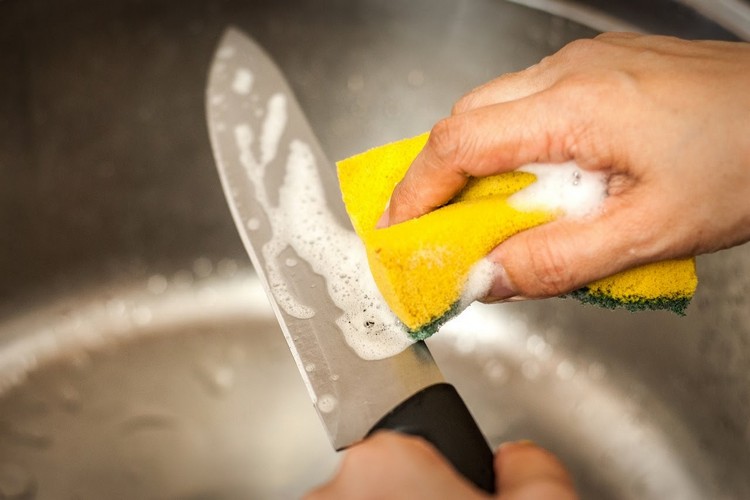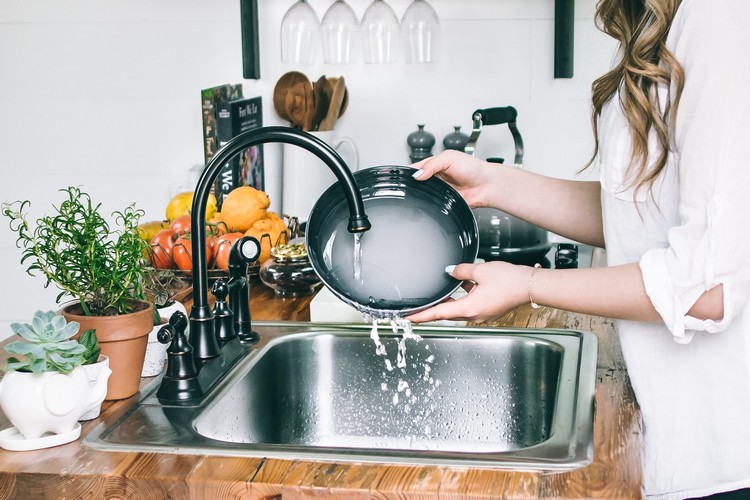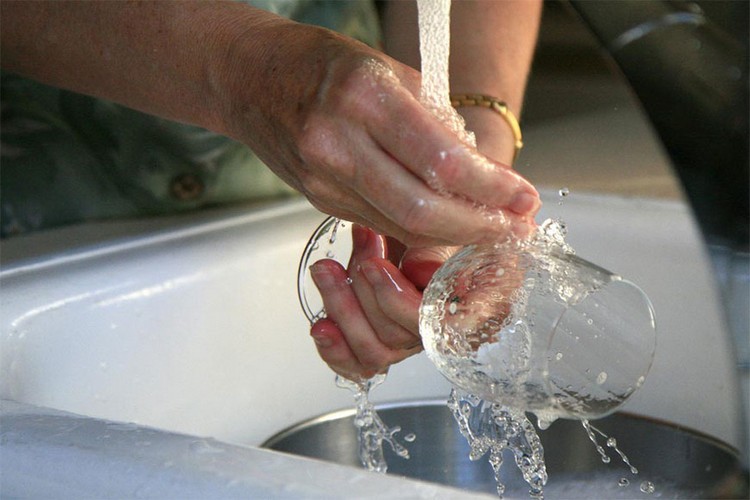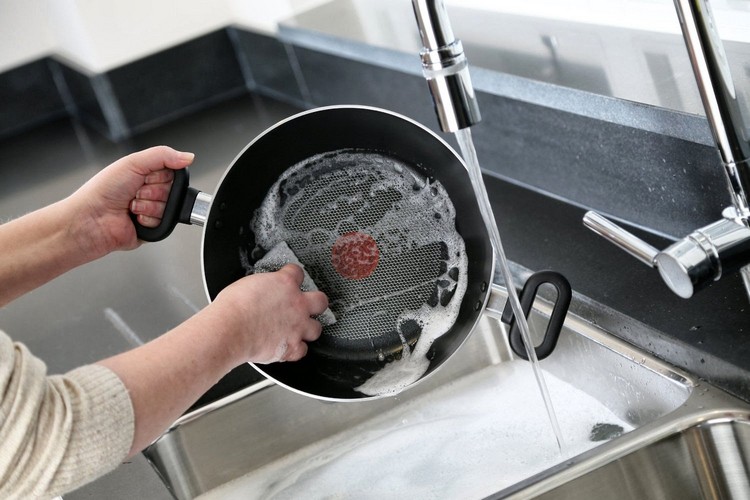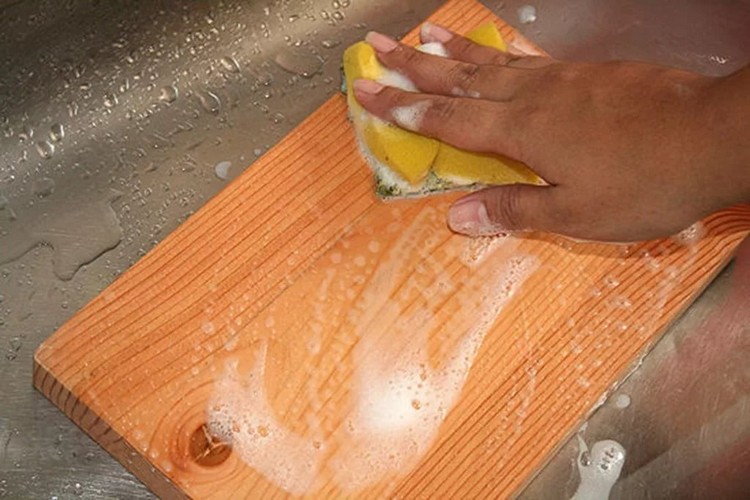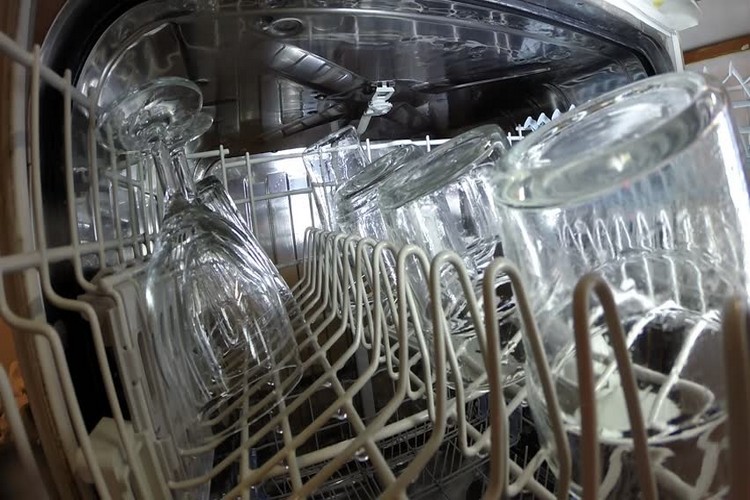Overview of what not to wash in the dishwasher: a list of unsuitable dishes
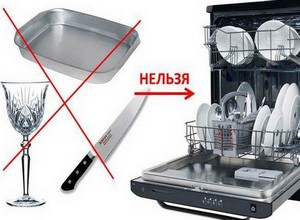 The dishwasher has become a true friend and a wonderful helper for housewives.
The dishwasher has become a true friend and a wonderful helper for housewives.
It allows you to save time and effort on cleaning up after eating.But not all kitchen utensils can be washed in the car.
Tempered glass products, heat-resistant plastic, unprinted porcelain and ceramic items, enameled dishes - all this and more can be loaded into the dishwasher.
The identification mark will be the symbol on the dishes, which shows the plates in the dishwasher container.
For different manufacturers, this icon may be slightly different, but its essence is the same.
But what kind of dishes absolutely cannot be washed in a typewriter, we will analyze in this article.
Content
Knives and tools
Under the influence of high temperatures and aggressive detergents, the metal from which the knife blades are made corrodes.
Despite the fact that the manufacturer often calls the steel from which the knife blades are made stainless (stainless steel), in some cases rust does appear.
In addition, the resistance of the knife to rust is also determined by the coating of the blade. Under the influence of a strong pressure of heated water, the substance designed to protect the blade is erased from the surface over time, exposing the vulnerable metal. The edge of the knife is blunted, it becomes necessary to sharpen the knife.
In addition, the knife handle can also be exposed to hot water and detergent. So wooden handles become unusable after several washing cycles.
Do not immerse kitchen graters, scissors, knives from a meat grinder, food processor and blender into the dishwasher. Items on this list will definitely become dull during washing.
metal utensils
Plates, mugs, pots and other metal utensils require washing at a low temperature and using gentle products.
Washing them in the dishwasher can not only spoil the integrity and appearance of the product, but also lead to the ingress of harmful chemical elements into food.
aluminum cookware
Aluminum is a very active metal, easily entering into chemical reactions with other substances, including water.
On the surface of aluminum there is an oxide film, which easily dissolves in an alkaline environment. Alkalis found in dishwasher detergents dissolve and remove this film from aluminum cutlery. A dark, indelible coating forms on their surface, which spoils the appearance of the dishes.
At the same time, harmful chemical compounds can get into food, since there is no longer a protective layer on the dishes.
Cast iron cookware
Frying pans and stewpans, cauldrons and goose pots, cast iron baking sheets are considered strong and durable utensils that can withstand high temperatures during cooking on the stove, in the oven, on the grill.
But in the dishwasher, under the influence of water temperature changes, chemical detergents, cast iron can crack and corrode. The dishes will lose not only their appearance, but also their functionality.
Therefore, it is better to wash cast iron products by hand using non-aggressive products.
Silverware
Silver forks and spoons, sets and trays have always been considered a sign of wealth and good taste. To this day, silver items are in the kitchen of a good housewife. But in no case should you combine silver and a dishwasher.
Chemical compounds contained in detergents for PMM have a negative effect on the mirror shine of silver products. Silver becomes cloudy, covered with a gray coating and becomes similar to aluminum.
copper utensils
When detergents contained in dishwasher tablets interact with copper products, the latter lose their attractive appearance - they darken and become cloudy.
It will not be possible to return the original state of the dishes, so it is better to prevent damage.
cupronickel utensils
Beautiful and elegant dishes made of copper-nickel alloy (cupronickel) after washing in the dishwasher will be seriously damaged: they will darken, become cloudy, and the pattern will be erased.
plastic utensils
Before you open the machine and load plastic dishes into it, you need to study the symbols on the back.
Only heat-resistant food-grade plastic with a special icon can be washed in PMM. The crossed out symbol categorically prohibits washing in the dishwasher, just like the symbol "PS" (polystyrene product) or "PVC" (PVC). When heated, these substances turn into harmful compounds and are toxic to humans.
Disposable plastic cups, cutlery, food containers should never be washed in the dishwasher.Such dishes should be thrown away after a single use.
Very delicate products
Fragile and fragile dishes made of crystal and porcelain, ceramics and glass can crack and break under the pressure of water during washing in the car.
Some PMMs have a delicate mode designed specifically for such products.
How not to spoil expensive dishes, we will analyze further.
Crystal objects
It is advisable to wash crystal in the dishwasher separately from other dishes, using a special mode for washing crystal, using gentle detergents and rinse aid for shine.
But nevertheless, this does not guarantee that crystal glasses or vases will remain safe and sound and will not lose their original appearance. Therefore, it is better to expose them to hand washing.
Porcelain
If there is no special image on porcelain dishes that allows washing in a machine, then it is better to abandon this idea.
Not only can fragile porcelain crack under the influence of high temperatures of water and steam, but also the pattern and decorative elements that adorn porcelain products can be irrevocably washed.
Patterns and gilding on the border of cups and saucers are not stable under the influence of detergents (such as "Fairy"), so the dishes will lose their decent appearance after the first cycle in the PMM.
Ceramic tableware
In most cases, the manufacturer allows cleaning ceramics in the dishwasher, but do not forget about the applied images. If the crockery is decorated, it is automatically considered hand-washable only.
Clay dishes
Pots and molds made of clay, but glazed, should not be placed in the dishwasher.
The porous structure of the material during prolonged exposure to hot water, steam and chemicals will lose its strength and soon crack.
Cookware with non-stick coating
The non-stick coating is very easy to use: food does not burn, which makes it easier to cook and clean.
But such a coating is not always strong and durable and requires special care.
Teflon coated pan
The Teflon coating is fragile and very sensitive to the effects of chemical compounds in detergents. It deteriorates and cracks after two or three washings in the PMM. Teflon lags behind and begins to peel off, and when cooking, it can ruin the dish.
Crockery with granite and marble chips
Such frying pans, cauldrons and stewpans are very durable, little susceptible to mechanical damage and retain heat well.
But this material is afraid of aggressive detergents, so not every dish with a granite composition can be washed in a dishwasher. You can verify this possibility by carefully examining the label from the dishes.
ceramic coating
Just like all-ceramic cookware, a ceramic non-stick pan is very good for cooking on any hobs. But it can deteriorate when washed in PMM, so it is better to save such products and wash them by hand.
Wooden utensils and cutting boards
Wooden plates, spoons, cutting boards, and any utensils with wooden handles are absolutely not suitable for the dishwasher.
During the operation of the PMM, under the influence of heated water and hot steam, the tree swells, and after drying it loses its shape and cracks. Wooden products become unusable after several washings.
Kitchenware
In the kitchen there is always a huge number of different items with which cooking becomes fast and intricate.
But not all kitchen utensils can be washed in PMM.
Grater
As described above, the blades on the grater can become dull during washing in the dishwasher. But do not forget that food residues that clog the holes in the grater are washed out during the wash cycle and clog the drain filters of the machine.
It is much easier to fill the grater with detergent and wash it by hand immediately after use, without creating unnecessary problems for yourself.
Strainer and colander
The strainer in the dishwasher can become deformed, and pieces of food or tea leaves can clog the filters.
A plastic colander can be washed in a dishwasher only if the manufacturer allows it. Aluminum colanders can only be washed by hand.
The same applies to the garlic press. PMM will not wash out garlic residue in small holes. In the meantime, the hostess will clean the garlic press, the latter will at the same time and thoroughly wash under running water.
glass jars
From year to year, blanks can be sterilized and closed in the same jars, but it is advisable to change the lids.
Glass jars can be washed in the dishwasher if they do not have labels and there is no food left in them.
But the lids cannot be loaded into the PMM, the silicone layers on the inner surface of the tin lids will deteriorate during washing.
Thermoses, lunch boxes and thermo mugs
The design and outer material may be quite suitable for washing in the PMM. The internal structure, which retains heat, deforms under the dividing effect of high temperatures and ceases to fulfill its function.
It is better not to wash such dishes in the dishwasher so that they keep the heat of the cooked food as long as possible.
Silicone forms
Silicone mats and molds can be washed in the dishwasher, but do not forget that they can absorb harsh chemicals, so if they are slightly dirty, they can be quickly washed under the tap.
Thus, the dishwasher is an indispensable assistant in the kitchen, but you need to use it wisely so as not to spoil not only the dishes, but also the dishwasher itself.
Useful video
About the dishes that cannot be washed in the dishwasher, they will tell in the video:



